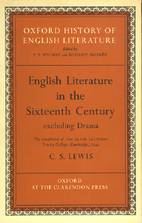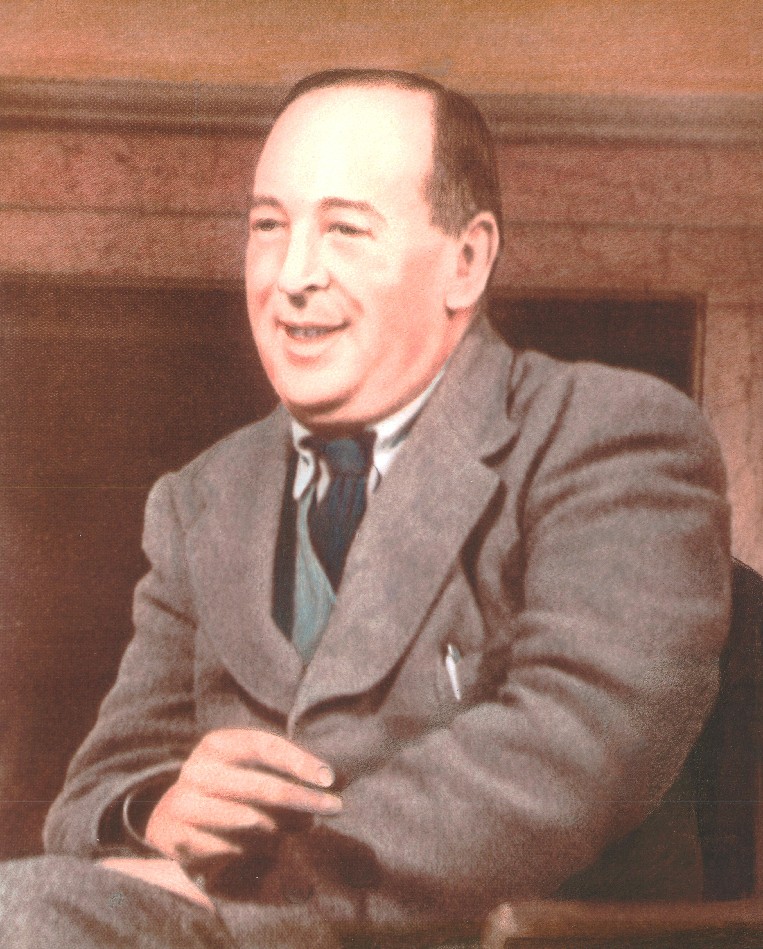
Out of all of C. S. Lewis’s books, probably one of the least-read is his English Literature in the Sixteenth Century, part of the Oxford series on the history of English literature. As with The Allegory of Love, its academic focus can be daunting for anyone unfamiliar with the roster of authors and titles he covers. I’m nearly halfway through the book, and I’ll admit the sections on poetry are a tough grind for me. Yet even in those highly specialized sections, the Lewis wit can sparkle.
Lewis’s introduction to the book is superb, though, in every way. It can stand on its own as a commentary on the entire era, providing a historical overview that brings greater understanding. Let’s just say I’ve marked up many pages so I’ll be able to come back to his most memorable comments.
On the very first page, Lewis strikingly contrasts the literature of mid-century with what follows:
Nothing is light, or tender, or fresh. All the authors write like elderly men. The mid-century is an earnest, heavy-handed, commonplace age: a drab age.
Then, in the last quarter of the century, the unpredictable happens. With startling suddenness we ascend. Fantasy, conceit, paradox, colour, incantation return. Youth returns. The fine frenzies of ideal love and ideal war are readmitted.
I’ll try not to be offended by the comment that those authors wrote like elderly men—that’s too close to home. Calling the middle part of the century a “drab age” paints a mental picture. The opposite picture is portrayed by words like fantasy, paradox, youth, and fine frenzies.
Sometimes, what Lewis offers is just one sentence that stands out from the rest, such as this: “Though we all know, we often forget, that the existence of America was one of the greatest disappointments in the history of Europe.” America, you see, was this infuriating obstruction blocking the way to the riches of China. Literature of the era, notes Lewis, was not really inspired by the discovery of the Western Hemisphere.
As most Lewis scholars know, he was not convinced there was a real Renaissance period, and his critique of some of the humanists of the day is showcased in this introduction. They focused too much on style and not substance, in his view, which led to this comment:
Elevation and gravity of language are admirable, or even tolerable, only when they grow from elevation and gravity of thought. To imitate them directly is to manufacture a symptom. . . . Any clever boy can be taught to write Ciceronian prose.
Although Lewis loved language and spent considerable time ensuring that his words carried his thoughts in the best way possible, he knew that flowery language in a vacuum of thought was not worth the reading or writing.

In his comparison of medieval writing with the attempts of the humanists of the sixteenth century, the humanists don’t come off well. “When medieval literature is bad, it is bad by honest, downright incompetence: dull, prolix, or incoherent.” That’s not necessarily a ringing endorsement of some medieval literature, but he continues with this opinion: “But the varnish and stucco of some neo-Latin work, the badness which no man could incur by sheer defect of talent but only by ‘endless labor to be wrong’ is a new thing.” The humanists, he believes, may have created something new under the sun after all, but that’s not a compliment.
The so-called Renaissance humanists’ rejection of medieval scholasticism was not an improvement. Whatever scholasticism may have gotten wrong, it did so from a base of knowledge and logical argumentation. Lewis always loved a decent argument, but the humanists didn’t really offer any, in his view.
No humanist is now remembered as a philosopher. They jeer and do not refute. The schoolman advanced, and supported, propositions about things: the humanist replied that his words were inelegant. . . .
The war between the humanists and the schoolmen was not a war between ideas: it was, on the humanists’ side, a war against ideas. It is a manifestation of the humanistic tendency to make eloquence the sole test of learning.
Lewis was raising his own argument here, and not everyone in his field agreed with him, but they had to take him seriously due to his own depth of learning. I find his sentence “They jeer and do not refute” to be just as prevalent today. How often do we try to debate propositions only to be met with sneers, jeers, and anything except a rational response?
I’ll offer one final Lewis quote from the introduction that sums up nicely his argument about the humanists.
In the field of philosophy humanism must be regarded, quite frankly, as a Philistine movement: even an obscurantist movement. In that sense the New Learning created the New Ignorance.
Perhaps every new learning makes room for itself by creating a new ignorance. In our own age we have seen the sciences beating back the humanities as humanism once beat back metaphysics. Man’s power of attention seems to be limited: one nail drives out another.
The introduction to the OHEL (Lewis’s humorous term for it) is well worth the read, and I only scratched the surface in this post. I suspect more will be coming later.
